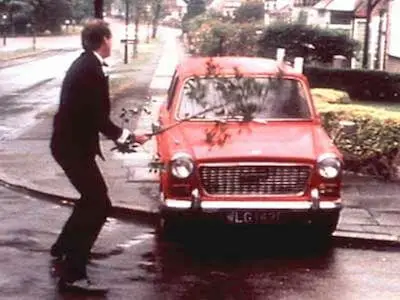Aggressively argumentative, and sometimes violent, behaviour indulged in by drivers when annoyed by other road users’ actions.
Road rage
What's the meaning of the phrase 'Road rage'?
What's the origin of the phrase 'Road rage'?
‘Road rage’ appears to have been coined in the USA in the 1980s. Several citations of it exist from that time and place, for example, this from the St. Petersburg (Florida) Times, 2nd April 1988:
“A fit of ‘road rage’ has landed a man in jail, accused of shooting a woman passenger who’s [sic] car had ‘cut him off’ on the highway.”
A rival newspaper, the Ocala Star-Banner, ran the story on the same day and they included a quotation from a police officer:
“It was just a traffic incident that sparked the whole thing.” Police Chief Bob Roberts said of the shooting. He said the suspect had [a] simple case of ‘road rage’.
It doesn’t seem likely that Roberts coined the term – the enclosing quotation marks around the phrase are an indication that it was already known, but not necessarily known to all the paper’s readers, in 1988.
The term, and the behaviour, stayed in America for several years before migrating elsewhere.
It wasn’t seen in the UK, or at least it wasn’t reported as ‘road rage’, until the 1990s. John Cleese demonstrated an excellent precursor to it in Faulty Towers in 1974, albeit getting angry with the car rather than another motorist.
This piece appeared in June 1994 in The Sunday Times (London):
“It was an amazing sight for motorists stuck in traffic in the north London suburb of Hendon. After cars had jockeyed for last-minute advantage, they watched as a leading member of Britain’s orthodox Jews leaped out of his gold Mercedes and punched a Buddhist monk sitting at the wheel of a Nissan Micra. The attack earned David Schreiber, an elder of the United Synagogue, a fine and convictions for assault and threatening behaviour. It also placed him among the growing numbers of ordinary British people caught up in ‘road rage’, a problem that police, motoring organisations and psychologists say is sweeping the country.”
‘Road rage’ is now worldwide, both as a name and as a behaviour. The name at least is popular enough to have spawned imitators. Following Watergate, every scandal is now ***-gate. Likewise, whenever anyone becomes argumentative about something, it is ‘something rage’; for example ‘air rage’ – the misbehaviour of unruly aircraft passengers. Most airlines now provide information leaflets on how best to avoid this. There was even an ‘Air Rage’ feature film made in 2001. There is also ‘trolley rage’ – arguments over supermarket trolleys, and ‘lounger’ rage at pool sides. Road rage is less common, or at least it is less commonly reported. Possibly because motorists are controlling their stress better or, more probably, because it is no longer considered newsworthy. A more recent favourite, especially in the UK, is ‘bin rage’. Here’s an example, printed in the Bristol Evening Post, July 2001:
“A man who admitted in court he suffered an attack of ‘bin rage’ when binmen failed to collect rubbish from his girlfriend’s house has been cleared of attacking two refuse collectors.”
See other phrases that were coined in the USA.
The history of “Road rage” in printed materials
Trend of road rage in printed material over time
Related phrases and meanings
Browse more Phrases
About the Author

Phrases & Meanings
A-Z
A B C D E F G H I J K L M N O P Q R S T UV W XYZ
Categories
American Animals Australian Bible Body Colour Conflict Death Devil Dogs Emotions Euphemism Family Fashion Food French Horses ‘Jack’ Luck Money Military Music Names Nature Nautical Numbers Politics Religion Shakespeare Stupidity Entertainment Weather Women Work
How did we do?
Have you spotted something that needs updated on this page? We review all feedback we receive to ensure that we provide the most accurate and up to date information on phrases.
